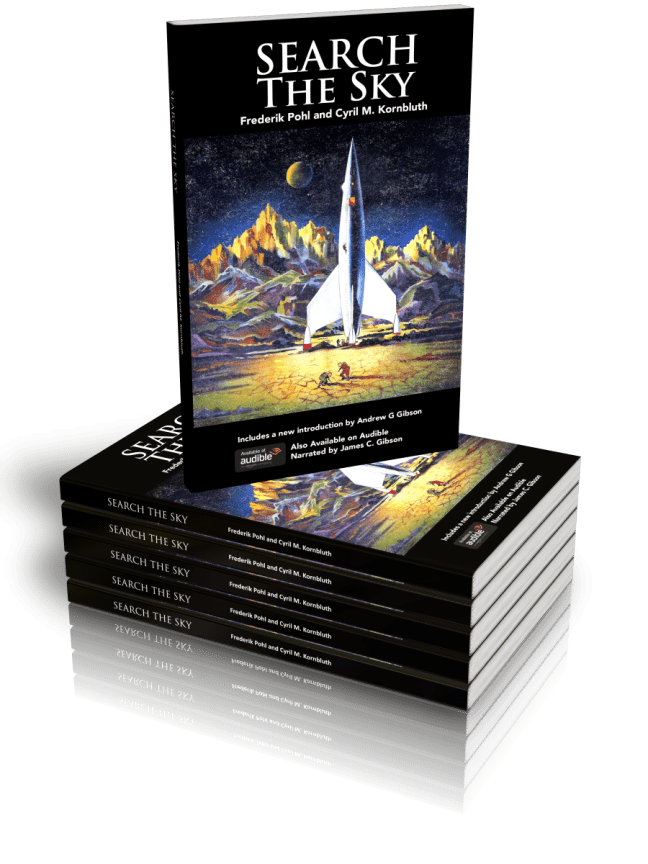“Search the Sky,” a science fiction masterpiece by Frederik Pohl and C.M. Kornbluth, offers a deep exploration into the complexities of interstellar colonization. First published in 1954, the narrative follows Ross, a resident of Halsey’s Planet, who is tasked with an urgent mission to investigate the decline of other human colonies. What sets this story apart from other space travel narratives is its incorporation of faster-than-light travel, a technological advancement that adds a unique layer of complexity to the genre. This feature allows the story to transcend typical space travel limitations, opening up a broader canvas for the authors to explore intricate societal and psychological themes. The novel serves as a compelling lens through which to examine human psychology, societal structures, and the moral quandaries that come with technological progress.

Plot Summary
The plot centers around Ross’s mission, which is made possible by a specialized spacecraft equipped for faster-than-light travel. This technological marvel enables him to traverse vast interstellar distances in a relatively short period, allowing him to visit multiple colonies facing unique challenges. From colonies governed by authoritarian regimes to those paralyzed by societal apathy, Ross’s journey becomes a rich tapestry of human experience. The authors use these diverse settings to delve into a myriad of human behaviors and societal challenges, making the plot a multifaceted exploration of the human condition. The urgency of Ross’s mission adds a layer of tension to the narrative, making each discovery and interaction crucial to the overarching quest to understand the decline of human civilization across the stars.
Themes
- Human Nature and Society: Search the Sky offers an in-depth examination of human nature’s dual role in both the formation and decay of societies. Each colony Ross visits serves as a microcosm of human behavior and governance, reflecting both the strengths and weaknesses inherent in humanity. The novel scrutinizes how human nature can be both a catalyst for societal growth and a hindrance, leading to stagnation or even decline.
- Technology and Dependence: The novel provides a critical look at society’s over-reliance on technology, particularly focusing on the ethical implications of advanced space travel technologies like faster-than-light crafts. It questions whether such advancements truly serve humanity or lead to unforeseen complications that could threaten the fabric of society.
- Existential Crisis: The declining populations across colonies serve as a metaphor for a broader existential crisis. The story raises poignant questions about the purpose and sustainability of human expansion into space, making the reader ponder the ethical and existential implications of colonization.
Characters
- Ross: Ross is a complex character who undergoes significant personal growth throughout his journey. His transformation from a somewhat naive individual to a seasoned traveler adds a relatable human element to the story’s grander themes. His experiences and interactions with various colonies provide valuable insights into the complexities of human nature and society.
- Secondary Characters: The individuals Ross encounters in each colony are not mere placeholders but complex, multi-dimensional characters. They each contribute to the story’s thematic richness, offering different perspectives on the central issues and adding layers of complexity to the narrative.
Writing Style
Frederik Pohl and C.M. Kornbluth employ a prose style that strikes a balance between readability and thematic depth. The pacing is well-calibrated, allowing for immersive world-building without sacrificing the narrative’s momentum. Dialogue is used effectively to reveal character motivations and to provide insights into the various societies Ross encounters. The authors’ ability to weave complex themes into a compelling narrative makes the book a rewarding read for those interested in both the science fiction genre and the study of human behavior.
Conclusion
“Search the Sky” is a compelling and thought-provoking read that offers a multifaceted look at human nature, societal complexities, and the ethical implications of advanced space travel technologies. Its intricate plot, well-developed characters, and deep thematic undertones make it a timeless classic in the science fiction genre. The novel serves as a mirror reflecting the complexities of human nature and society, making it a must-read for anyone interested in exploring the ethical and psychological dimensions of human existence.




